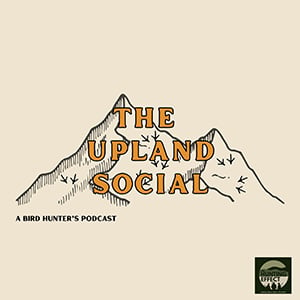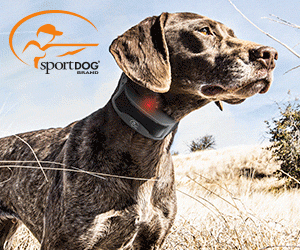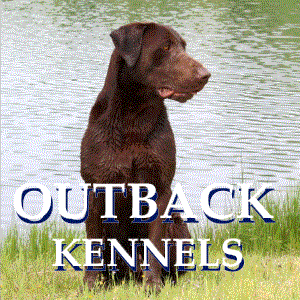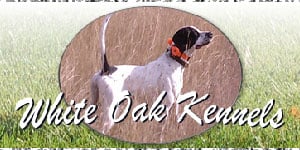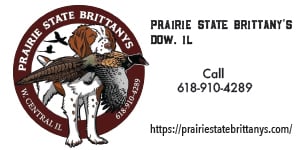A Lost Dog
Billy was a serious pro. He ran all-age dogs from his home base in Lee County, Georgia where he had worked ten years after high school on a Yankee quail plantation until he got tired of saddling other men’s mounts and an aunt died and left him $50,000 he invested it in a horse trailer and three-year-old diesel dually and declared himself a pro. He had since been traveling the all-age circuit September through March, training up here July and August, fishing the Gulf April through June. He’d been married, then divorced five years ago, was striving to stay single and ahead of his creditors.
Billy’s deal for training grounds this year had been made with Frank Becken and his neighbors. Frank, great-grandson of homesteaders, owned and farmed four sections, some cultivated, some prairie pasture. It held enough cover and birds—sharp tails, Huns, pheasants—to make for good training. As a bonus, Frank had a vacant old cinder block bungalow with a working well and septic system that Billy and his helper Ronnie Blevins could live in. The bungalow lay east of an acre-plus shelter break, ideal shade for the 50-gallon plastic barrels to house the dogs short-chained to them.
Frank and his wife Becky had a sixteen-year-old son, Jimmy, who was autistic. He did not speak, but was obviously very bright, which he showed in many unexpected ways.
In October of the previous year a pointer puppy, mostly white with a few orange specks on its ears, had wandered up to the Becken curtilage. It wore no collar, appeared to be about nine months old, and was thin and hungry. They tried to find its owner without success. It and Jimmy were soon inseparable. They named the pup, a male, Smiley, for what it made Jimmy do.
The Beckens had a quarter horse for Jimmy, and he rode it fearlessly. Without invitation he began to ride with Billy whenever Billy roaded or worked a dog. He was not intrusive and by watching Billy and Ronnie quickly deduced how he could be of help to the training operation. At the end of the third training day, he had Smiley in a roading harness on a rope when Billy picked up the day’s last derby to be worked.
By gestures, Jimmy indicated he wanted Billy to work Smiley, so Billy said, “Turn him loose,” which Jimmy did. Smiley struck out for the front, hunting for birds from the first lick. He soon found a young pheasant, which he flash pointed, then flushed and chased gleefully. Billy smiled at Jimmy and gave him a thumbs up, which Jimmy returned.
Billy kept Smiley down a half hour, after which it was apparent the pup, now a derby, had field trial potential. Wonder how he is bred? Billy thought. By the end of the week he thought he knew, on the top side.
By August 1, Smiley was clearly the top derby in the string in training. He continue to mature and improve. His style on point was gorgeous, his gait fluid and light footed with a cracking high tail, his speed great, but he did not outrun his nose. He always had finding birds on his mind. He revealed no obvious holes.
To have his field trial wins recognized, Smiley would have to be registered in the
FIeld Dog Stud Book. Billy had no doubts Smiley would place in trials. Billy had
already decided on a litter of pointers he had raised that he could claim Smiley a member of—he like many breeders always increased the number of pups claimed as born in a litter by at least one male and one female in enrolling a litter.
Billy at lunch break picked up at the Lignite post office a batch of mail forwarded to him by his mother from his box in Leesburg, including a copy of the American Field. Back in his dually, he opened it and browsed the contents. His eyes fell on a full page of text without photographs or a byline. Its headline contained the initials DNA.
He began to read it. Its message would revolutionize the breeding of bird dogs. No longer could trial dogs be misrepresented as to sire or dam (birth dates, the most often misrepresented fact, still could be, but at increased peril).
Billy wondered, could this lead to discovery of Smiley’s identity? And his next thought, if it does, will Smiley be claimed away from Jimmy? He would fight like hell against that.
On his drive back to Frank Becken’s from the Lignite post office, Billy thought about the DNA announcement in the Field and wondered, if we send Smiley’s saliva to the FDSB, can they determine who his sire and dam are, if someone has earlier sent saliva samples to the FDSB to enroll Smiley’s litter?
Billy had a contact in the FDSB-American Field office in Chicago. He called her and asked. She did not know but said she would try to find out. Billy thanked her and said he would call back in a few days.
Soon the end of August loomed. Billy called in his entries for the two trials scheduled to start Labor Day at Columbus, including Smiley in the two derby stakes. He pondered registering Smiley as from the litter he had raised, but decided to wait until after the Columbus trials.
Smiley was the stand-out winner of the first derby stake at Columbus. He scored two finds with acceptable fall derby manners and ran an ideal pattern with speed and hunting application. Jimmy rode in the gallery, accompanied by his parents. The joy on his face when the winners were announced warmed the hearts of all in the gallery, about forty riders, including a half dozen locals, the rest pro handlers and their summer helpers, and owners of other dogs entered in the trial or trialing fans who had come just to enjoy the show.
When the second derby stake commenced, Smiley had gone down in the second brace. Billy at the last minute decided to have Jimmy road Smiley at the back of the gallery during the first brace, then ride front for Smiley. Ronnie Blevins would scout Smiley. He was scheduled to fly home through the Atlanta airport from Minot the next morning to start his senior high school year in Albany.
When released in the second brace, Smiley shot to the front and disappeared. Billy made a guess and motioned Ronnie to search right, then rode forward hoping to spot Smiley. Both handler and scout were absent when Smiley came back toward the judges dead from the front, and Jimmy, first to see him, yelled in a loud voice never before heard, “ Billy, here is your dog,” then blew three sharp blasts on his pea whistle, a gift to him from Billy just before the trials began.
Jimmy’s mom burst into tears. Tears appeared on the cheeks of his father (they had been riding right behind Jimmy). Billy did not hear Jimmy’s yell, but he heard the three whistle blasts and soon rode in from the left front. He saw Jimmy’s mom crying and was alarmed, then a judge called him over and explained what had happened.
Smiley won the second derby stake convincingly. Word spread instantly among the fraternity that Field Trials had a new derby rock star. Only slightly slower, word spread of Jimmy’s first spoken words at age sixteen, “Billy, here’s your dog.”
Something else fateful had happened the evening of the day of Smiley’s first field trial win. Billy FedXd to the office of the FDSB in Chicago completed forms to register Smiley as from the litter he had enrolled earlier. Only Billy had to sign, because he owned both sire and dam. Neither claimed parent had its DNA on file with the FDSB.
This action would allow Smiley to get credit, on the books of the FDSB, for his two derby wins at Columbus, albeit under false colors. And what would happen when Smiley won or placed in a derby championship? Billy contemplated that briefly, then said to himself, “I’ll deal with that when it happens.”
Meanwhile, Smiley would henceforth be entered in trials as Lignite Smiley, James Becken, owner.
Back at the Becken home place after the Columbus trials, Billy made a proposition to Jimmy’s parents. Let me take Jimmy down the road with me on the circuit as my helper and scout.
Jimmy had not spoken further since his call out to Billy during Smiley’s race. Still, Billy was confident Jimmy could do the job, and the obvious joy he got helping work Smiley and the other dogs in the string confirmed that belief.
Jimmy’s mom was at first reluctant, but a night alone with his father convinced her it would be best for Jimmy. Like all parents of autistic children, the couple were consumed by worry about what would happen to Jimmy when they were gone from the earth or unable physically to care for him. While obviously not without risks, Billy’s proposition offered a chance for Jimmy to prove he could live independently of them.
Their first trial after Columbus was in Ohio, a pheasant trial with open derby and all-age stakes. Smiley placed first in the derby stake; Jimmy found him pointed twice and he handled the pheasants with all-age manners. Then they were in Kansas at a wild bird trial on quail with derby and all-age stakes. Smiley placed second in the derby with a forward and responsive race and two broke finds. Jimmy found him pointed on the second near time.
Jimmy had not spoken again since his call out to Billy when riding front at Columbus. Billy talked to Jimmy on their drive from Kansas to Lee County about his need to call out when he found a dog on point. Jimmy nodded he understood. At the Lee County trial, the first piney woods trial Jimmy would attend, this would be very important.
They arrived at Billy’s home, a trailer parked on forty rented acres adjoining Senah Plantation and containing twenty acres of pasture, the rest piney woods. Billy had kennel space for twenty dogs and an open-sided shed providing shade for horses and dry storage for a few bales of hay.
Billy supplemented his income during quail hunting season by taking hunting parties out to hunt over his trial string or providing his string and his guiding services to shooting plantations needing extra capacity for shooting guests. In return, several of these allowed Billy to work his string on their hunting lands on non-hunt days and before the season opened and after it closed. Being a local and not a come-here was a distinct advantage to Billy.
For their first week home, Billy worked his string on three plantations. It was Jimmy’s first experience in this terrain, but he adapted quickly to it. Smiley also quickly adapted.
Billy had been calling his contact at the FDSB occasionally about its ability to identify parentage from saliva samples when the names of both parents were unknown. He finally got this intelligence: only if the name of one parent who’s DNA was in the data bank of the lab used by the FDSB could be supplied could (or would) the lab confirm that dog was a parent of the orphan pup whose saliva was submitted blind as to the other parent.
Billy had asked the hypothetical question, suppose I submit a sample and the name of the suspected sire whose DNA is on file with the FDSB. Will it advise me if my suspicion is correct? The answer was no, only if names of both claimed parents was submitted would the FDSB confirm or deny. Billy next asked, if in that case one parent was correctly identified but the other not, would the FDSB tell the submitter which parent was incorrectly identified and which correctly identified by the submitter? Billy was unable to get an answer to this question from his contact at the FDSB. This puzzled him.
The Lee County trial was next on Billy’s circuit. It had a rich history, having been sponsored by the Moreland family and run on their lands many years, headquartered at George Moreland Jr.’s Coney Lake Plantation just east of Leesburg. The trial was managed by Big George’s son, George III, a professional trainer-handler affectionately known as Bubba. It offered open and amateur stakes in the Derby, Shooting Dog and All-Age categories. Smiley would be entered in the Open Derby and All-Age stakes, this his first go in an All-Age stake.
He placed second in the Open Derby. Then in the hour All-Age, things got interesting. Shortly after his release Smiley disappeared. Billy motioned right to signal Jimmy to search for him on that side of the course as he rode on following the course path, hoping Smiley would be found pointing ahead or would come back from the front.
In five minutes Billy heard Smiley’s brace-mate’s scout calling point and rode toward him to determine if the pointing dog was Smiley’s brace-mate or Smiley. When Billy approached, the scout said, “I was relaying to you your scout’s call of point from in there (he indicated the direction by pointing). So, Jimmy had spoken for a second time in his life!
Billy located Jimmy and he was sitting his horse watching Smiley, pointed in a plum thicket and barely visible. But he had a single and stayed pointing stylishly when Billy flushed it, and the judge said “saw it.”
Billy said, “ Good job, Jimmy!” and under his breath to the judge as they rode to the front together, “That’s the second time Jimmy has ever spoken in his life.”
Next day, Smiley was announced winner of the Open All-Age stake, making him half-qualified for the National Championship.
Smiley’s next trial would be the Continental Derby Championship at Dixie Plantation the third week of January, 2004, the only wild-bird Derby Championship and a hugely prestigious stake to win. Smiley and Jimmy were the talk of the field trial fraternity, News of their win at Lee County spread quickly.
*. *. *.
A long-time subscriber to the American Field Magazine was Harley Snead, a Missouri farmer who had been a quail hunter since boyhood. The reporter of the Lee County trial had included a paragraph on Smiley’s mysterious appearance at Frank Becken’s farm east of Lignite, North Dakota in October 2002. The story sent a jolt through Harley.
The October before he had embraced an adventure. He had loaded his hunting bird dogs in plastic airline crates beneath the shell over the bed on his pickup and with his fellow-farmer hunting partner driven from Missouri to North Dakota to hunt sharp tails, Huns and pheasants on publicly available lands. Included among the dogs was a green nine-month-old pup, gift to him from his brother-in-law, a West Kentucky farmer.
While parked for the night at a motel at Fargo, his dogs had been stolen with their airline crates while he and his hunting partner slept in the motel. They had in the morning come down to let the dogs out to empty on check cords to discover the theft. They had reported the theft to Fargo police, then driven home to Missouri, never to see the dogs again. The Field article he read about the Lee County trial, including the photos of Jimmy posing Smiley for the winners photo, set him to wondering.
Rumors about how the new DNA rules would be interpreted swirled among trialers.
Through the rumor mill, Billy learned that if the sire and dam of a dog in competition were dead, their offspring would be exempt from having to prove their parentage by DNA. Billy surreptitiously sold the claimed registered parents of Smiley to a South Texas supplier of truck dogs to hunting guides. He did not provide registration papers, gave a false name to the buyer and insisted on payment in cash.
*. *. *
Lignite Smiley drew the last brace in the Continental Derby Championship. With Jimmy scouting he ran a near perfect race, and scored three clean finds. He was found by Jimmy on the third, and Jimmy did not call out to Billy but rode to the course path, caught Billy’s eye, then rode back to where he had left Smiley pointed, Billy following. Luckily, Smiley had stayed put (afterward Billy would explain to Jimmy this was too risky, and again that he needed to call out, which he had done twice).
Riding in the gallery had been Harley Snead. While not a trialer he had always wanted to attend the Continental trials and see Dixie Plantation. And he wanted to see Lignite Smiley. He had photos of the pup that had been stolen from him at Fargo a year and three months earlier.
After Lignite Smiley was declared Continental Derby Champion, Harley approached Billy and introduced himself, then pulled from his shirt pocket snapshots of a white pointer pup with a few orange spots on its ears. He explained to Billy and Jimmy the theft of the pup. He did not claim Smiley was that pup, but he saw tears appear on Jimmy’s cheeks as the lad stood silently listening.
Billy said, “How was your pup bred?”
Harley answered, “ My sister’s husband bred him. He farms in Kentucky. The sire’s name was Miller’s White Powder. His dam was a Miller-bred hunting dog of my brother-in-law’s.”
Billy’s long held suspicion was confirmed. Billy waited for Harley to continue and claim ownership of Smiley, but he did not. Instead he said this:
“My sister and her husband have an autistic son about Jimmy’s age. I have seen what Smiley means to Jimmy. Good luck to you and Jimmy with Smiley. I look forward to the day he is named National Champion.”
Billy impulsively grabbed Harley and hugged him.
“If you ever want to bird hunt North Dakota again I am sure Jimmy’s parents would like to host you and your brother-in-law and your sister and their son. “
“We will for sure take them up on that offer,” Farley said.
*. *. *
Postscript
A month later a half-brother of Lignite Smiley would be named National Champion.
A saliva sample taken from Miller’s On Line showed his dam had been incorrectly named in his registration application. The true dam was owned by the same person and the registration corrected. But this would lead to all later sired offspring of White Powder being declared ineligible for registration by the FDSB and to its refusal to register any change of ownership of White Powder, thus rendering him worthless as a stud dog.

About the Artist : Leah Brigham
Visit artist websiteAfter graduating from Millersville University of Pennsylvania with a Bachelors of Science in Art Education, Leah began teaching Art to inner city Middle School students in Houston and later Dallas, TX. Leah has shared with her students her passion for art and nature. This passion has sustained her and continued throughout her life in the form of painting and drawing.
Leah was introduced to American Field Horseback Field Trails and has been able to experience the excitement of seeing her own dog, competing for the National Championship at Ames Plantation in Grand Junction, TN ...standing on point, head and tail held high. This has inspired her to create works of art depicting dogs and the wildlife associated with the sport and hunting.



